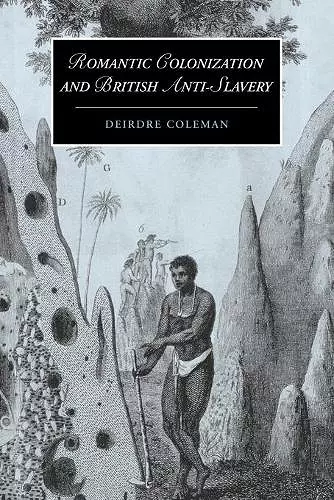Romantic Colonization and British Anti-Slavery
Format:Paperback
Publisher:Cambridge University Press
Published:12th Mar '09
Currently unavailable, and unfortunately no date known when it will be back
This paperback is available in another edition too:
- Hardback£95.99(9780521632133)

The loss of Britain's North American colonies sparked an intense debate about the nature of colonization in the period 1770–1800. Drawing on archival research into colonies in Africa and Australia, including Sierra Leone and Botany Bay, Deirdre Coleman shows how the growing popularity of the anti-slavery movement gave a utopian cast to the debate about colonization. This utopianism can be seen most clearly in Romantic attempts to found an empire without slaves, a new world which would also encompass revolutionary sexual, racial and labour arrangements. From Henry Smeathman and John Clarkson in Sierra Leone to Arthur Phillip and William Dawes in Botany Bay, Coleman analyses the impact of the discourses and ideals underlying Romantic colonization. She argues that these paved the way for racial strife in West Africa and the eventual dispossession of Australia's native people.
"This important contribution to scholarship on late-18th-century imaginings of colonization is based on a close-reading of a wide variety of contemporary British writings about Botany Bay in New South Wales and Sierra Leone in Africa. Coleman combines British intellectual and political history with literary studies to make a connection between utopian visions of colonization and radical political causes, such as campaigns against slavery, the movement for penal reform, and support for the French Revolution." - Choice
"...redefines the romantic by making romantic sensibility central to colonialism..." - Studies in English Literature
"Coleman offers a set of fascinating and, in places, inspiring, episodes in the history of the West African colony of Sierra Leone . . . Coleman's study happily reopens for romanticists the issue of utopianism and politics . . . an excellent book." - Slavery and Abolition, Anne Janowitz
"Deirdre Coleman's valuable study examines the complexity of the discourse of colonization during the last two decades of the eighteenth century. Interested in colonization not only as a practice, but also as an imaginative activity, she explores in wonderful detail the many ways in which abolitionist discourse played an important role in the promotion of colonization and the complicated ways in which the discourse of colonization negotiated issues of race, gender, and class.... Those interested in the literature of colonial contact will much to value in Deirdre Coleman's Romantic Colonization and British Anti-Slavery. The product of a close literary examination of an important documentary archive on early British colonial settlements, Coleman's book provides a valuable addition to current work being done on the negotiation of race, gender, and class in early British imperialism." - Journal of Colonialism and Colonial History, Alan Bewell
"Coleman does an excellent job ... [having written] an archivally grounded and critically perceptive investigation.... Anyone interested in imperial studies or rhetoric will find much of value in Romantic Colonization." - Studies in Romanticism, Vincent Caretta
"A great strength of the book is its historical depth. Coleman is a literary scholar who is also an extremely good historian. She uncovers compelling evidence about the people who produced the texts she examines; the study of the 'flycatcher' Smeathman is done particularly well. Coleman has an eye for contradiction and ambiguity. She allows her subjects to breathe, as it were, and doesn't try to smooth over human complexity.... The vivid detail and deft nuance of each study makes every section not only illuminating but also very readable. - The International Journal of African Historical Studies
ISBN: 9780521102711
Dimensions: 229mm x 152mm x 17mm
Weight: 440g
296 pages